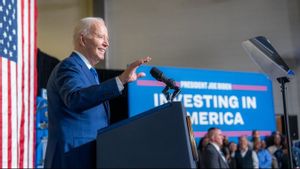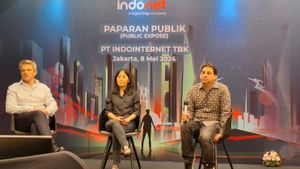
JAKARTA - Nvidia CEO, Jensen Huang, revealed on Wednesday 6 December that the California-based company that designs artificial intelligence chips is working closely with the United States government to ensure that new chips for the Chinese market comply with export restrictions.
Nvidia has dominated more than 90% share of the $7 billion (IDR 108.5 trillion) artificial intelligence chip market in China. But analysts predict new US restrictions on chip exports will likely create opportunities for competitors in China.
Last month, Reuters reported that Nvidia had told its customers in China that the launch of new artificial intelligence chips focused on the Chinese market would be delayed until the first quarter of next year.
Huang was reluctant to confirm the Reuters article. "Nvidia has worked very closely with the US government to create products that comply with its regulations," Huang said at a press conference in Singapore. "Our plan now is to continue working with the government to produce a range of new products that comply with the new regulations with certain limitations."
He added that Nvidia needs to seek advice from the market, and that process is still ongoing, noting that Huawei is a "formidable" competitor.
Nvidia had warned during its November financial report that it expected a sharp decline in fourth-quarter sales in China following the new US rules.
관련 항목:
Huang noted that China's revenue contribution to Nvidia has traditionally been around 20%, but it's hard to predict how much that will change with the new US export restrictions.
Separately, he said that Nvidia was in talks with Singapore about a potential large investment and was working with the city-state to help develop its own large language model, Sealion.
Singapore's Infocomm Media Development Authority (IMDA) announced on Monday, December 4, a 70 million Singapore dollar (IDR 806.6 billion) initiative to develop Southeast Asia's first major language model.
Huang noted that Singapore has a rapidly growing artificial intelligence ecosystem and its role as a major data hub for many markets in Asia.
The English, Chinese, Japanese, Arabic, and French versions are automatically generated by the AI. So there may still be inaccuracies in translating, please always see Indonesian as our main language. (system supported by DigitalSiber.id)
















